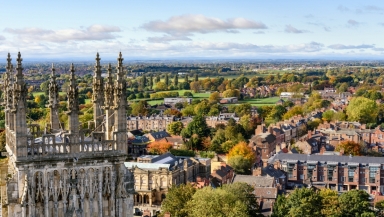
The Church of England's bishops are staring defeat in the face at November's General Synod over a holding motion on services of blessing for same-sex couples.
The Bishop of London, Sarah Mullally, is due to move the motion on behalf of the 53-member House of Bishops on November 14, the second day of the Synod meeting in London.
In February the Synod voted in favour of the new services, called Prayers of Love and Faith (PLF), after the extensive Living in Love and Faith (LLF) consultation on marriage, sexuality and gender, which the bishops launched across the C of E in 2017.
But in October the House of Bishops meeting in private session voted by a narrow margin to delay the implementation of stand-alone PLF services until a Synod vote in 2025, which would require a two-thirds majority. The bishops feared legal challenges if they had authorised the services this year on their sole authority.
They announced that clergy would soon be able to use the new liturgy in existing services, such as Morning and Evening Prayer and Holy Communion. But clergy would only be allowed to use the prayers as part of a service.
Bishop Mullally's motion proposes that Synod "conscious that the Church is not of one mind on the issues raised by Living in Love and Faith, that we are in a period of uncertainty, and that many in the Church on all sides feel pain at this time, recognise the progress made by the House of Bishops towards implementing the motion on Living in Love and Faith passed by this Synod in February 2023". The motion also proposes that Synod "encourage the House to continue its work of implementation".
This may sound anodyne enough to go through easily. But such is the level of distrust and disillusion with the bishops among both conservative and revisionist members of Synod in the Houses of Clergy and Laity that this motion could offer them the chance to deliver a slap on episcopal wrists.
Though he is not a Synod member, prominent Anglican LGBT campaigner, the Rev Dr Charlie Bell, led the assault on Bishop Mullally's motion in a recent article on the revisionist Via Media website, edited by Synod lay member, Jayne Ozanne.
He wrote: "The motion being presented has inexplicably returned to the language of pain 'on both sides', as though there is even a remotely comparable situation for LGBTQIA people and those who oppose us having even private prayers. The motion doesn't even mention us – we are once again at best an abstract issue, and at worst simply erased."
He added: "The motion states, too, that we are in a 'period of uncertainty': we are not, a clear decision was made in February and the House of Bishops is actively choosing to frustrate its clear purpose. There is talk of 'implementation'. Where, precisely, is this implementation?"
There is a precedent for a conservative-revisionist alliance against the bishops. In February 2017, the Synod's House of Clergy refused to "take note" of a report on sexuality which the bishops had published offering "maximum freedom" for gay Anglicans but no change to the CofE's doctrine on the heterosexual nature of marriage.
It went too far for some conservative clergy and not far enough for revisionists, so they joined forces to vote it down by 100 to 93. Because the take-note motion required a majority in each House of Synod, bishops, clergy, and laity, the report had to be shelved. This led to the bishops deciding to launch the LLF process culminating in Synod's decision to support same-sex blessings last February.
Bishop Mullally's motion is likely to be passed by the House of Bishops, which includes the C of E's diocesan bishops and nine elected suffragan (assistant) bishops, but probably not by as large a margin as the motion in February when only four bishops voted against it. In October seven diocesan bishops, four of whom voted for same-sex blessings in February, came out against pushing ahead with the new services.
Unlike in 2017, this time there is a strong possibility that both the Houses of Clergy and Laity could reject the bishops' holding motion. Unfortunately for the bishops, it is worded in such a way that conservatives and revisionists could vote it down without compromising their principles.
It is of course easier for conservatives to reject it because they oppose the implementation of the services altogether. But revisionists could vote against it to express their dissatisfaction with the lack of progress the bishops have made in implementing stand-alone services and their distrust of the bishops' ability to deliver them in the future.
A defeat for the bishops would not stop the PLF from coming into use in existing services. But it would deal a devastating blow to the bishops' ability to implement the dedicated celebrations of homosexual relationships in parish churches which the Synod voted for.
Julian Mann is a former Church of England vicar, now an evangelical journalist based in Lancashire.













